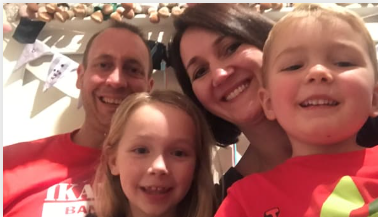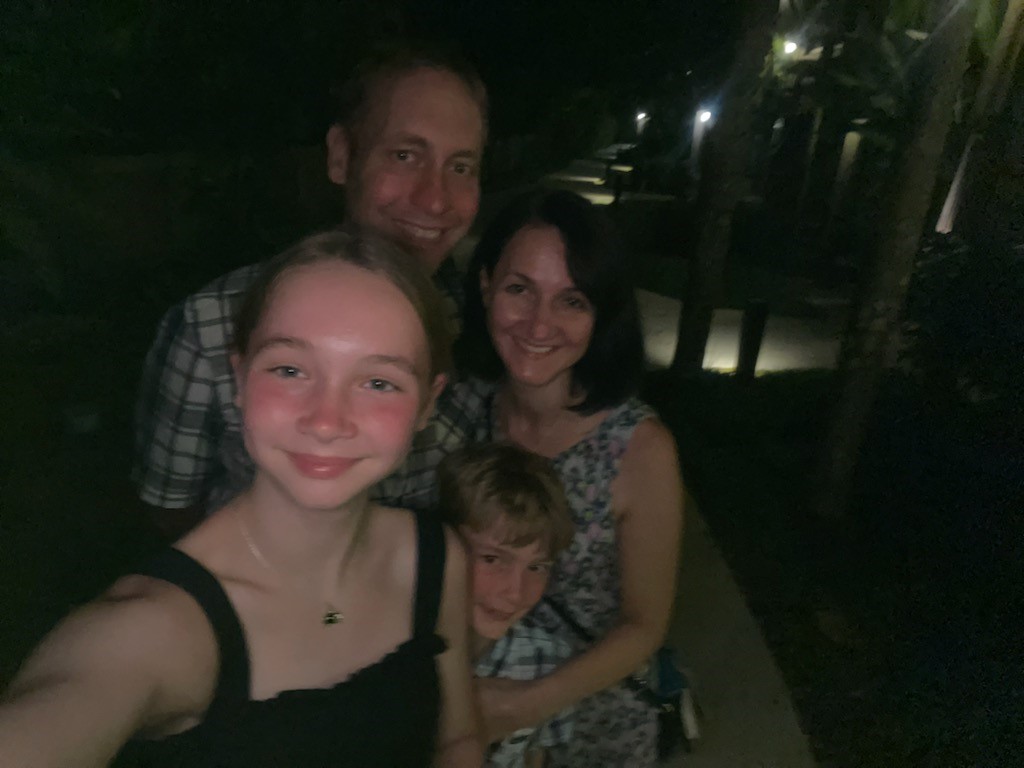Autoimmune Limbic Encephalitis Lived Experience – Lorna’s Story

Lorna’s story:
In January 2013, I was sent home from work as a colleague recognised that I wasn’t myself. The next day I was admitted to hospital, and four weeks later, after two drug-induced comas, countless investigations and a five-day treatment of plasmapheresis, I was discharged from hospital.
I have been extremely lucky. My husband was called in to say goodbye, and later was told to expect anything from a good recovery to severe brain damage. These words still send shivers down my spine. Now, almost six years on, I am back at work as a practice pharmacist, able to drive and fly to go in holiday again, and, most importantly, am able to be a wife and a mum to Jasmine who is now 8 and Jacob who is 4.
So what has changed? Post-encephalitis, I take medication to control my nocturnal seizures, have memory problems mainly affecting my short-term memory and am unable to drink alcohol but that’s pretty much it.
I work as a practice pharmacist in two GP practices where I support the team regarding anything connected to the safe and effective use of medicines. I never doubted that I would be able to return to work but I needed to demonstrate that I am still clinically competent. Before returning to work in January 2014, I underwent psychometric testing. These memory tests akin to the Krypton Factor assessed all parts of my memory. Happily, I was declared fit to work. I also took part in another study as I am able to function at a higher level than my MRIs would predict. Not bad for someone who can’t remember if they turned off their straighteners most mornings!
To the outside world I look the same, but people who knew me before encephalitis may notice a difference. There are significant gaps in my memory for the 18 months prior to encephalitis, and I am not always able to make new memories, especially if I have only met someone or experienced something once or twice. This can be embarrassing, but my family, friends and colleagues accept this as part of me.
As you’d expect, a lot of things have changed in six years. I’ve met several of my closest friends at the school gate, and they’ve only ever known me post-encephalitis. In many ways that helps me to feel normal – whatever normal is – as there’s no reference to memories that I no longer have.
However, meeting new people both personally and professionally is not without its dilemmas. At what point should I tell people about my memory? Too early and I could appear to be protesting too much, and too late and people may have noticed my memory deficit and may have thought that I wasn’t listening to conversations and considered me to be ignorant or judged my professional competence. I do have a picture of my MRI on my phone case which sometimes makes the decision of when to tell people for me – especially as it looks like a cross between a lion and something out of Star Wars!
Over time, I have become more comfortable with sharing my experience with encephalitis, and generally tell people much sooner than I would have done a few years ago. I rarely refer to encephalitis, instead I use the term brain injury. As a pharmacist I’m embarrassed to say that I hadn’t heard of encephalitis until I was told that I was recovering from it, and neither had the paramedic who looked after me after one of my seizures.
Each year, World Encephalitis Day is a reminder to stop and remember what really counts in our lives and how lucky we have been and continue to be. We hope that sharing our experiences will not only increase awareness of the condition but offer reassurance for those in the early stages of recovery, that – with a few adjustments – life can return to normal, whatever that is!
Update for 2024
It’s now 11 years since I was diagnosed with encephalitis which is hard to believe – time really does fly. So what’s happened in the last 5 years?
During COVID having epilepsy meant that I ended up shielding working remotely. Whilst I felt fortunate to be at home with my family in uncertain times, I was also frustrated that unlike my colleagues I wasn’t able to contribute directly in patient care working in our local vaccination centre as I would have been before encephalitis.
Indirectly working remotely made me evaluate how much time I was spending travelling between Nottingham and Derby to work and I began to think about changing jobs but despite the benefits of being able to spend more time with our family I was nervous. Although the fundamental role of a clinical pharmacist wouldn’t change moving jobs would mean learning how a new organisation works, new faces, new places, new names. Would I be able to do that with post encephalitis?
In 2021 I did change jobs and now work as a care homes pharmacist. The change was challenging, especially as our team has two Helens! Learning new faces and names remains harder than it used to be – especially over teams. Despite the challenges and apprehension moving jobs was definitely the right decision – not moving would have been letting encephalitis win.
Health wise I’ve been seizure free since 2014. I made decision to remain on antiepileptic medication rather than trial without as having a seizure now would mean loosing my driving license again which would affect our family. I feel more confident to travel again which was something Mark and I really missed when we were advised against flying.
Jasmine and Jacob are now 13 and 9 and old enough to understand what happened in 2013 and why I can loose things, forget conversations. I’m sure that can be frustrating for them – as is my need to take as many photographs as I do – but I do find it helpful to cement memories. I still rely on my phone for reminders and to make ‘to do’ list – something Jasmine and Jacob are keen to highlight when I’m asking them to put their their tech down!
I still find people in my phone contacts twice as I can’t remember I’ve met them before which can be embarrassing when that happens face to face. Do I apologise for not remembering them or explain what I can’t and make the most of the opportunity to increase awareness of the condition but also remind myself how lucky we’ve been? Increasingly I feel more comfortable about about being honest – having an acquired brain injury is part of me now, and whilst it can be frustrating at times, I’m still incredibly lucky to be here to be frustrated!

Lorna’s story
Find out more about limbic encephalitis here
Get help
Our support team are available from 9am to 5pm (GMT), Monday to Thursday, and 9am to 4.30pm (GMT) on Fridays.
To get in touch, simply call +44(0)1653 699599.
Contact our helpline
